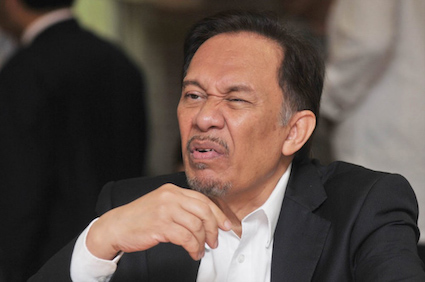Sarawak state election will be Anwar Ibrahim’s Waterloo

(Bloomberg) – Voters in Malaysia’s biggest state are set to reject the opposition alliance in elections on Saturday, increasing pressure on Anwar Ibrahim to step aside as de facto leader and forcing a rethink in strategy ahead of a national vote that may be called as soon as next year.
The polls in Sarawak in Borneo island is expected to present another major defeat for Anwar’s Pakatan Harapan. That’s a given because the local parties that have controlled the state since independence are aligned with the ruling United Malays National Organization.
The opposition has already been thrashed last month in a state election in peninsular Malaysia thanks to an UMNO campaign led by disgraced former premier Najib Razak who focused on reviving a pandemic-battered economy. Najib criticized the opposition for harping on his corruption trials linked to troubled state fund 1MDB, although an appeals court upheld a guilty verdict soon after the polls.
UMNO won’t contest in the Sarawak polls, preferring to back local parties in the resource-rich state. Their certain victory will help it consolidate its power after the pro-Malay party returned to the top seat of government four months ago and could bring forward the next general election that must be held by 2023.
Blaming Anwar’s leadership alone for Pakatan Harapan’s inability to make any headway in Sarawak would be “hoping for a quick fix, but little would change,” said Wong Chin Huat, a professor of political science at the Jeffrey Sachs Center on Sustainable Development at Sunway University in Malaysia.
Pakatan Harapan needs to transform into a policy-based coalition instead of a mere election-based alliance and form a shadow cabinet if it wants to compete, Wong said. “With a shadow cabinet, Anwar’s potential heirs will naturally emerge. Without that, a new captain without a functioning team will not keep any excitement for long.”
Anwar’s own fortunes are also seeing a slide along with that of the opposition coalition.
There have been calls for him to resign and make way for younger leaders after the dismal showing at the Malacca state election that saw his own party completely wiped out. Anwar has acknowledged the calls within the opposition coalition to step down but has brushed aside the need to do so immediately.
Anwar’s Parti Keadilan Rakyat still backs him as the opposition leader, although internal party elections that must be held by May 2023 could see some changes.
“We don’t see a change at the very top. Keadilan will have party elections soon that will see a clearer, younger line-up post Anwar, but Anwar will still be leading the campaign for GE15,” said Nik Nazmi Nik Ahmad, a PKR lawmaker, referring to the next general election.
Anwar has struggled for decades to take power in Malaysia. He was seen as Mahathir Mohamad’s successor in the 1990s before he was fired and spent six years in jail for abuse of power and sodomy. He went back to jail again in 2015 on a subsequent sodomy charge during Najib’s time as prime minister.
It was only after Anwar’s party joined forces with other opposition groups and his old foe Mahathir to unseat UMNO in a shock election win that he was released, thanks to a royal pardon. But his turn at the top job still eluded him.
Mahathir, who was supposed to make way for Anwar to become prime minister, kept pushing back the handover date that eventually led to the unraveling of the government.
Rural Sarawak
Anwar and Mahathir mainly tapped voter disillusionment with UMNO in the 2018 elections to win big, focusing on Najib’s troubles with debt-laden state fund 1MDB. This holds little traction in rural Sarawak then and now, as pledges on building roads and raising incomes are the main issues.
“It is very, very difficult to dislodge the government there,” said James Chin, a professor at the University of Tasmania. That’s mainly because much of Sarawak is made up of small villages patronized by government-aligned chiefs who dictate which parties the voters should support, he said.
Elections in Sarawak are often an opportunity for voters to get cash and food handouts from the ruling parties in exchange for their support at the ballot box, which is illegal by a law that is rarely enforced. Some 1.25 million voters in Sarawak will elect 82 lawmakers to the state assembly in the polls that were delayed due to a five-month Covid-induced emergency that lifted in November.
While the opposition has been unable to agree on who should lead their campaign for the Sarawak elections, there has been consensus on seat allocations and they have been campaigning separately under a looser platform.
Some in Pakatan Harapan see that as a good road map for the next national elections, a reversal from the coalition’s earlier strategy to contest under Anwar’s party logo in the 2018 polls.
“Component parties should highlight their own manifestos and use their own logos,” said Nik Nazmi Nik Ahmad. The opposition is going into Sarawak as “very much the underdogs,” he added, a scenario similar to the future national polls.

